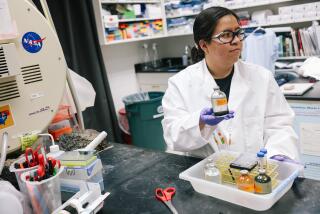NORTHRIDGE : Disabled Youths Begin Science Workshop
- Share via
With a burst of violent hand signals, Anna Kim angrily dismisses the idea that her deafness might hinder a career in engineering. But Cal State Northridge and the National Aeronautics and Space Administration want to make sure.
Kim, 18, is one of 11 students with a variety of disabilities enrolled in a four-day workshop at CSUN funded by NASA to help prepare people with disabilities for careers in science and engineering.
The program, Project APT (Access to Professional Technical Careers), is part of a $225,000 NASA grant program aimed at increasing the number of disabled people in these jobs. Monday’s series of lectures and exercises introduced the students to the type of classes they may take as CSUN students, and also helped university officials determine what adaptive equipment that the students might need when they begin their courses next fall.
“We have found in our recruitment efforts that we are not finding the number (of disabled workers) we would like to,” said Michael Hartman, manager of NASA’s employment program for people with disabilities at Goddard Space Flight Center in Greenbelt, Md. “People with disabilities are not encouraged to go into these careers.”
“Engineering in particular may be viewed as requiring a lot of equipment and a lot of agility. But we can adapt around that now,” said Diane Schwartz, interim dean of CSUN’s School of Engineering and Computer Science. “We want to show them there are no barriers to them going into science, or if there are barriers we can help.”
The students who took part in Monday’s workshop didn’t seem to need convincing. Blind students felt their way through an experiment on microprocessors with the aid of readers, while the deaf students appeared to have no trouble absorbing a jargon-packed lecture--covering such topics as RAMs, volatile memories and input/output ports--through the help of a sign language interpreter.
“I found it very interesting,” Kim said through an interpreter. “At first I thought it would be boring. But it’s not. It’s very complicated . . . and they are not like old people being rude to you. They really talk to you.”
More to Read
Sign up for Essential California
The most important California stories and recommendations in your inbox every morning.
You may occasionally receive promotional content from the Los Angeles Times.










